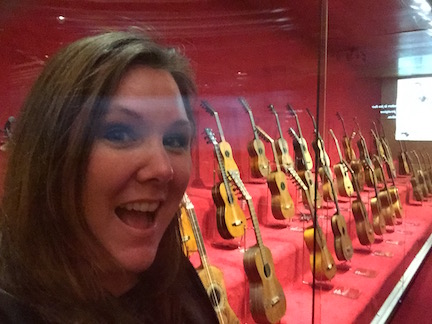
Break was a hit! I was sick on the couch for most of the week. I’m sure some little sweetie forgot to wash his/her hands before sharing their germs with me on an instrument, door handle or hand hold. I did get a chance to sneak in a little trip to Barcelona, Spain for a few days! Yes, I did get to see a flamenco guitar concert held in a gothic cathedral! And… I found a museum that had an excellent display of guitar instruments through the ages. Check it out above!
Week 4 (We’re on our way!)
By now you know that only one of my guitar classes has been able to keep up with regular music classes. All other classes are at least one week behind. Like many of you, I wear a lot of other hats at my school so there is no time to get the others caught up. In any case, this happened today…
Mapping Old Bands
“Mrs. Brobst, do you know the band Green Day? They’re a really OLD band”. Really kid?! Speaking of bands… we started out talking about the Beatles to see how many kids had heard of this band. I like to point out to the students that many Beatles (and Green Day) songs have as few as 3 chords and we also know 3 chords. So, we start our review with “Paperback Writer.” If you’re using the Guitar For Kids Method & Songbook, you can find a G7, C version on page 31.
My method for getting kids to read music is to make them look at the music and read the chords in tempo as if we were strumming. This helps students “map” the song and look for possible pitfalls before trying it with their fingers. I find it brings more success. We might even say the chords (later notes) with the play-a-long track so they have an idea of the tempo they are expected to keep. After the “mapping” exercise we play the song!
Singing and Echoing
We review notes on string 1 in a say and play finger numbers, then letter names. Since it’s been 2 weeks I’m having to do quite a bit of “re-teaching”. We review an old slide. I also like to take the opportunity to sing the pitches while I’m drilling them; students usually echo back with singing too. Once they catch on I can sing only letters/pitches without demonstrating on the guitar and have them echo by playing on the guitar. The next slide has 1 staff filled with notes and 2 blank staves with 4 measures each. Students choose the notes for the exercise and we attempt to play. The note choices are only quarter and half notes. This is a challenge! But, moving on to the 2nd string.
“It was in that movie!”
I use exactly the same procedure for teaching string 2. Play frets, echo fancy rhythms one fret at a time, say note names, echo fancy rhythms one note at a time, try with 2 notes at a time, then 3. (For more details see week 3) Now onto the paper training. Pg. 17. I cannot emphasize how important it is to read all the printed directions. Even though I’ve set this up for all students to be successful, they know where the notes are, there is that one kid (or two) who says, “Oh!” when we are reading and looking at these pictures! I don’t care how they “get it” as long as they eventually “get it”. As before have students group read notes with rhythmic values before playing. Notice “Cool Blues” only uses open strings! With full confidence we start! I play the 12-bar blues shuffle Teacher Accompaniment. “I know this song!” says one. “Me too! It was in that movie.” says another. 12-bar blues will have to wait for another day…
Rock Star Strum
Remember to follow this procedure for The Note C and D on pgs. 18 and 19. With about 5 minutes left in class, one little girl turned to page 20. “Ode to Joy! I want to play that!” Next week! To end class today, we wrap it up with “Feelin’ Alright” on pg. 38. This song is another G7, C song that is easy to play and many (not all) kids have heard it before. After the first practice run, I ask students to do a “rock star strum” for the last whole note. While we’re playing I tell them to make it look cool… We bob heads to the beat as we strum and then… ROCK STAR! Time to go.